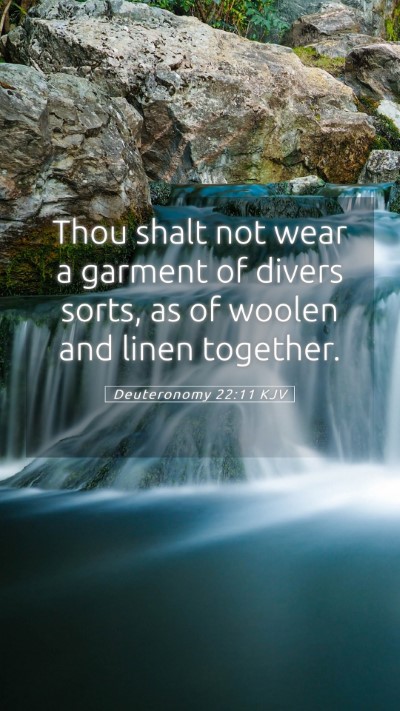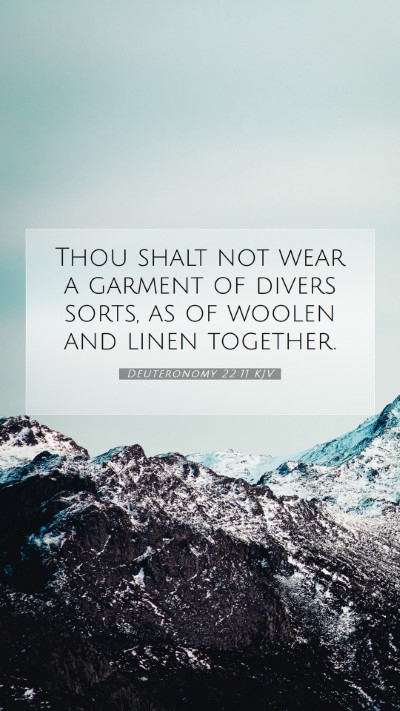Understanding Deuteronomy 22:11
Deuteronomy 22:11: "Thou shalt not wear a garment of divers sorts, as of woollen and linen together."
This verse comes from the Mosaic law given to the Israelites. It addresses a peculiar aspect of Israelite life and culture. Let’s explore the meaning and implications of this command through biblical commentaries.
Bible Verse Meaning
The commandment in Deuteronomy 22:11 has its roots in God's concern for the distinct identity of Israel as His chosen people. It reflects a principle of separation between different kinds, which is a recurring theme throughout Scripture.
-
Matthew Henry’s Commentary:
Henry elaborates that this command illustrates God's desire for His people to maintain purity and abstain from practices that might dilute their cultural and spiritual identity. By avoiding mixed fabrics, the Israelites are reminded to uphold their uniqueness and holiness.
-
Albert Barnes’ Notes:
Barnes posits that this law served a ceremonial purpose. It not only regulated the Israelites' clothing choices but also established a principle of distinction that applied to various areas of life, including religious practices. This distinction was meant to educate the Israelites on pursuing a dedicated lifestyle to God alone.
-
Adam Clarke’s Commentary:
Clarke emphasizes the symbolic nature of this law. The mixing of wool and linen could represent spiritual and moral confusion. By following this command, the Israelites set a precedent to avoid blending the sacred with the secular, which might lead to spiritual compromise.
Biblical Exegesis and Context
Understanding Deuteronomy 22:11 requires a closer look at its historical and cultural context. The Israelites were preparing to enter the Promised Land, where they would encounter various pagan cultures that embraced mixed practices in worship and daily life.
By adhering to such distinctions, the Israelites were reminded of their covenant relationship with God, emphasizing obedience and spiritual integrity.
Application of the Verse
This scripture can serve as a guide for modern Christians regarding the principles of separation and distinction in their spiritual lives. It encourages believers to live lives that reflect God's holiness and to avoid blending secular influences with their faith.
Key Applications Include:
- Maintaining a distinct Christian identity in a pluralistic society.
- Avoiding compromises in ethical and moral conduct that might arise from cultural pressures.
- Reminding oneself of personal holiness in decision-making processes.
Related Biblical Cross References
- Leviticus 19:19: "Ye shall keep my statutes. Thou shalt not let thy cattle gender with a diverse kind..." This emphasizes the broader principle of maintaining distinctions among God’s creation.
- 2 Corinthians 6:14: "Be ye not unequally yoked together with unbelievers..." This New Testament verse reinforces the call to maintain spiritual purity similar to the distinction in fabrics.
- 1 Peter 1:16: "Because it is written, Be ye holy; for I am holy." This verse aligns with the call to holiness reflected in Deuteronomy 22:11.
Conclusion
In conclusion, Deuteronomy 22:11 serves as more than just a clothing guideline; it encapsulates the importance of holiness, identity, and obedience to God. Through various commentaries, we gain a deeper insight into the meaning behind this scripture, connecting it to larger biblical themes and applications for today’s believers.


